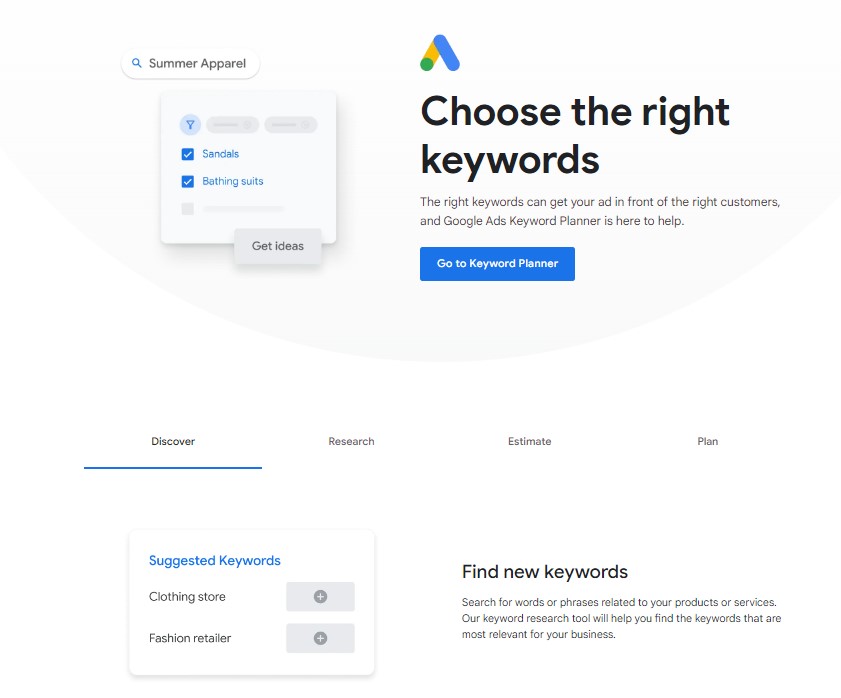
Master Google Ads Keyword: Tips for Successful Campaigns

Key Highlights
- Keywords are the backbone of Google Ads, connecting your ads with potential customers actively searching for products or services like yours.
- Effective keyword research is essential for identifying relevant keywords with high search volume and manageable competition.
- Proper keyword selection ensures that your ads appear in front of the right audience, increasing the chances of clicks and conversions.
- Monitoring, analyzing, and adjusting your keyword strategy is vital for maximizing your return on investment.
- Utilize various keyword match types to control how broadly or narrowly your ads are matched to search queries.
- Continuously optimize your campaigns by adding negative keywords to prevent your ads from showing for irrelevant searches.
Introduction
In the vast digital landscape of paid advertising, mastering Google Ads keywords and discovering new keyword ideas is paramount to running successful campaigns. This comprehensive guide will equip you with the knowledge and strategies needed to navigate the world of Google Ads keywords, from understanding the fundamentals to leveraging advanced techniques. Utilizing resources like the Google Keyword Planner, a free tool, to research search volume and strategically organizing your Google Ads account will lay a solid foundation for driving targeted traffic and maximizing your return on investment (ROI).
Understanding the Basics of Google Ads Keywords

Google Ads keywords are the foundation of your pay-per-click (PPC) advertising strategy. These are the terms or phrases that potential customers type into Google search when they are looking for information, products, or services like yours. By targeting the right keywords, you can ensure that your ads are seen by the right people at the right time, increasing your chances of getting clicks and conversions.
Selecting appropriate keywords ensures that your ads reach a relevant audience actively seeking what you offer. This targeted approach helps improve your ad's visibility, leading to increased clicks, website traffic, and ultimately, higher conversion rates for your business.
The Importance of Keywords in Google Ads
Keywords are the linchpin of your Google Ads campaigns. They act as the bridge connecting your offerings to the very users actively searching for them on Google using specific search terms. Through meticulous keyword research, you can pinpoint the specific terms your target audience uses when seeking products or services like yours. This process is crucial for several reasons.
Firstly, using relevant keywords ensures that your ads appear in front of the right audience. This targeted approach maximizes your ad spend by attracting users who are genuinely interested in what you offer. Secondly, well-chosen keywords contribute to a higher Quality Score, and creating separate ad groups to segment different audience interests enhances this metric. This metric plays a significant role in Google's ad ranking algorithm, potentially leading to lower ad costs and better ad positions. Lastly, a carefully curated keyword list helps you refine your ad copy. By incorporating these terms naturally into your headlines and descriptions, you create more compelling and relevant ads that resonate with your target audience, leading to higher click-through rates.
Different Types of Keywords and Their Impact
Not all Google Ads keywords are created equal. Understanding the nuances of different keyword types is vital for achieving optimal campaign performance. Here’s a breakdown:
- Broad Match: These keywords cast the widest net, allowing your ads to appear for a broad range of searches related to your targeted term. While offering extensive reach, broad match can sometimes trigger ads for less relevant searches.
- Phrase Match: Providing a more focused approach, phrase match keywords require the user's search to include the exact phrase, in the same order, but allows for additional words before or after. This option offers a balance between reach and relevance.
- Exact Match: As the name suggests, exact match keywords ensure your ads only show when a user searches for the exact keyword or phrase, offering the highest level of precision and control.
- Negative Keywords: These are terms you want to exclude from triggering your ads. Adding negative keywords prevents your ads from appearing for irrelevant searches, saving you money and improving the effectiveness of your campaigns. By strategically employing these keyword types, you can achieve a balance between maximizing your reach and ensuring your ads appear for highly relevant searches.
Setting Up Your First Google Ads Campaign: A Beginner's Guide

Embarking on your first Google Ads campaign can seem daunting, but it becomes a manageable process with a clear roadmap. Before crafting compelling ads, start by setting up a Google Ads account and familiarize yourself with its interface. The platform offers numerous resources and tutorials to guide beginners.
Once your account is ready, you can proceed to set up your first campaign. This process involves several key steps that will ensure your ads target the right audience, align with your budget, and drive the desired outcomes.
What You'll Need to Get Started
Before you dive into building your initial campaign, let's ensure you have the essentials in place:
- An Active Google Ads Account: Your gateway to the world of paid advertising, this platform allows you to set up and manage your campaigns.
- A Defined Ad Group: Within your campaign, ad groups allow for greater organization, grouping together related keywords and corresponding ads. This structured approach simplifies management and enhances the relevance of your campaigns.
- A Compelling Landing Page: This is where your potential customers land after clicking your ad. Ensure it's optimized for conversions, providing a seamless user experience, relevant information, and a clear call to action.
Step 1: Identifying Your Campaign Goals
Before crafting your first Google Ads campaign, start by defining clear and specific campaign goals. Are you looking to generate leads, drive sales, increase brand awareness, or promote a specific product or service? Clearly outlining your objectives will guide your keyword selection, ad copy, and overall campaign strategy.
If your goal is to drive sales through Google Search, focus on keywords that indicate a user's intent to purchase through a search engine. For general brand awareness, broader keywords might be more suitable to cast a wider net and introduce your brand to a larger audience. Align your campaign goals, keyword selection, and ad copy to resonate with your target audience's needs and interests for a successful outcome.
Step 2: Conducting Keyword Research
Once you establish your campaign goals, you can start researching relevant keywords using a combination of tools and techniques. Begin by brainstorming a list of keywords related to your business, products, or services. Consider what your target audience might type into Google search when seeking what you offer.
Expand your initial list by leveraging keyword research tools like the free Google Keyword Planner, which allows you to use Keyword Planner to gain insights into search volume, competition, and **keyword suggestions** for bid estimates. Analyze the search volume of different keywords to gauge their potential reach. Aim for a balance between high-volume keywords that can generate significant traffic and more specific long-tail keywords that target a niche audience.
Step 3: Creating Compelling Ad Copy
With a solid understanding of your audience, campaign goals, and relevant keywords, you can proceed to create engaging and persuasive ad copy. Your ad copy should grab attention, communicate your value proposition clearly, and entice users to click.
Incorporate your chosen keywords naturally within the headlines and descriptions to improve relevance and Quality Score. Highlight the unique benefits of your products or services, addressing your target audience's needs and pain points. A high-quality ad copy, along with the right keywords, will enhance your ad's visibility and effectiveness.
Step 4: Setting up Budget and Bids
Google Ads operates on an auction system. You set a daily budget that determines your maximum daily ad spend. Your bids represent the maximum amount you are willing to pay for each click on your ad. It's crucial to find a balance between bidding competitively to secure ad placements and managing your budget effectively.
Start with a realistic daily budget that aligns with your marketing goals and resources, ensuring it is sufficient to help you reach the first page of results and ideally the top of page. You can adjust this budget later based on your campaign's performance. Consider using automated bidding strategies offered by Google Ads, such as Maximize Clicks or Target CPA (Cost-Per-Acquisition), which can help optimize your bids based on your desired outcomes.
Step 5: Tracking and Measuring Success
Launching your Google Ads campaign is just the beginning. Continuous tracking and analysis are essential to maximize its performance and ensure its alignment with your goals. Leverage Google Ads' robust tracking tools to gain visibility into crucial metrics such as:
Metric
Description
Impressions
The number of times your ad has been displayed.
Clicks
The number of times users clicked on your ad.
Click-Through Rate (CTR)
The percentage of impressions that resulted in a click, calculated as (Clicks / Impressions) x 100.
Conversions
The number of desired actions taken by users after clicking on your ad, such as purchases, sign-ups, or form submissions.
Integrate Google Analytics to gain deeper insights into user behavior on your website after clicking your ads. By monitoring these metrics, you can identify what's working and what needs improvement.
Optimizing Your Google Ads for Maximum Performance

Optimizing your Google Ads campaigns is an ongoing endeavor, demanding constant monitoring, analysis, and adjustments to ensure you are getting the most out of your advertising investment. Google provides a range of tools and features, including the Google Ads Performance Grader, that help you analyze your campaign's performance, identify areas for improvement, and ultimately enhance your return on ad spend.
Regularly reviewing and refining your campaigns will ensure that you are continually maximizing their effectiveness.
Refining Your Keyword List for Better Targeting
Keyword refinement is a fundamental aspect of optimizing Google Ads campaigns, allowing for consistent improvement in targeting accuracy and overall campaign performance. Start by analyzing the performance of your existing keywords. Identify top-performing keywords that generate the most conversions or have a high click-through rate.
Allocate a larger portion of your budget to these high-performing keywords to maximize their impact. Simultaneously, identify and pause underperforming keywords that drain your budget without yielding desirable results. By continually refining your keyword list, you can fine-tune your targeting, ensuring that your ads reach the most qualified and receptive audience.
Utilizing Advanced Keyword Match Types Effectively
Mastering different keyword match types, including Google AdWords, is crucial for optimizing your campaigns and ensuring that your ads appear for relevant user searches. While broad match keywords offer extensive reach, they might trigger your ads for less targeted searches. Consider utilizing phrase match and exact match keywords to gain more control over when your ads are displayed.
Phrase match strikes a balance between reach and relevance, while exact match provides the highest level of precision, ensuring that your ads are only shown for highly specific searches. Experiment with different match types to determine what works best for your target audience and campaign goals.
Improving Quality Score with Relevant Ads
Maintaining a good Quality Score is paramount for maximizing your Google Ads campaign's effectiveness and lowering your cost-per-click. One of the key factors that significantly influence your Quality Score is the relevance of your ads to the keywords you are targeting.
When your keywords, ad copy, and landing page content are all closely aligned and highly relevant to the user's search query, it signals to Google that you are providing a valuable and consistent user experience. This, in turn, leads to a higher Quality Score. By consistently striving to deliver the most relevant ads to your target audience, you not only improve your ad's visibility but also boost your campaign's overall performance.
KeywordSearch: SuperCharge Your Ad Audiences with AI
KeywordSearch has an AI Audience builder that helps you create the best ad audiences for YouTube & Google ads in seconds. In a just a few clicks, our AI algorithm analyzes your business, audience data, uncovers hidden patterns, and identifies the most relevant and high-performing audiences for your Google & YouTube Ad campaigns.
You can also use KeywordSearch to Discover the Best Keywords to rank your YouTube Videos, Websites with SEO & Even Discover Keywords for Google & YouTube Ads.
If you’re looking to SuperCharge Your Ad Audiences with AI - Sign up for KeywordSearch.com for a 5 Day Free Trial Today!
Conclusion
Mastering Google Ads keywords is crucial for a successful campaign. Understanding the basics, conducting thorough research, and optimizing your ads are key steps to enhance performance. By refining your keyword list, utilizing match types effectively, and improving quality scores, you can elevate your ad relevance and reach the right audience. Regularly update your keyword list and tailor it to specific campaigns for better targeting. Remember, the right keywords are the foundation of a prosperous Google Ads campaign. Stay informed, stay relevant, and watch your campaigns thrive.
Frequently Asked Questions
How Do I Choose the Right Keywords for My Campaign?
Choosing the right keywords involves conducting thorough keyword research using tools like the Google Ads Keyword Planner. Focus on keywords with high search volume, low competition, and relevance to your offerings. Consider the searcher's intent and select keywords that align with their needs.
Can I Use the Same Keywords for Different Campaigns?
While you can use the same keywords for different campaigns, it's generally a good idea to tailor your keyword list at the ad group level for better relevance and organization. This approach allows for more targeted ad copy and landing pages, improving campaign performance.
How Often Should I Update My Keyword List?
Regularly update your keyword list to reflect changes in search trends, seasonality, and your business offerings. Utilize tools like Google Trends and the Keyword Planner to identify new relevant keywords and remove underperforming ones.
What’s the Difference Between Broad Match and Exact Match Keywords?
Broad match keywords trigger your ads for a wide range of searches related to your keyword, while exact match only shows your ads when a user searches for that exact keyword or phrase. Broad match offers reach, while exact match provides precision.
